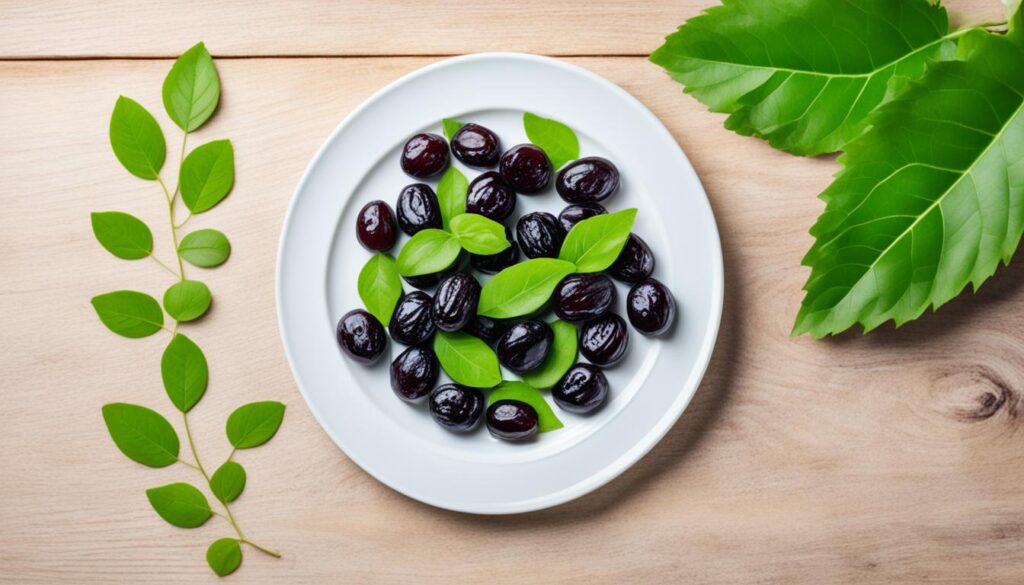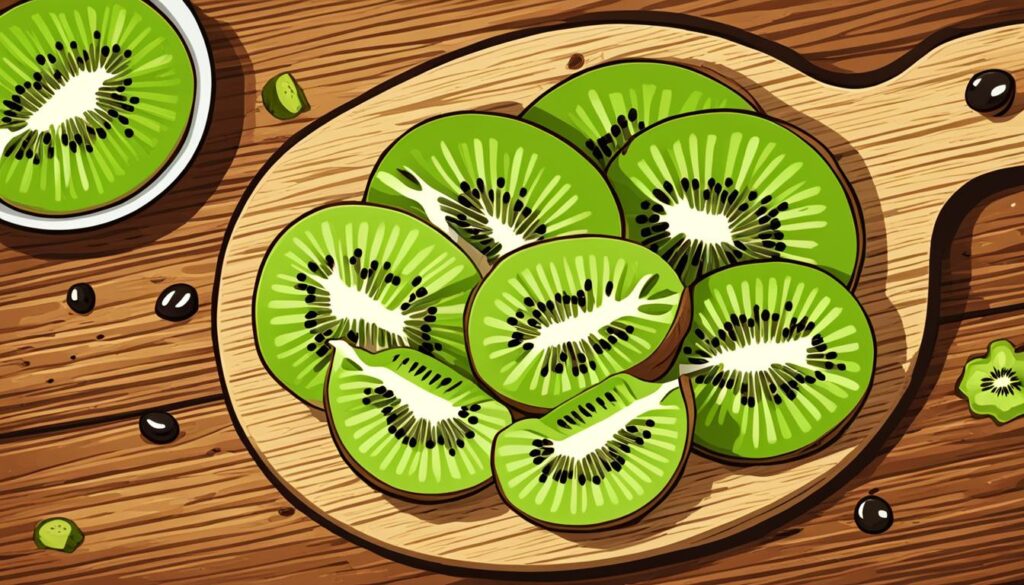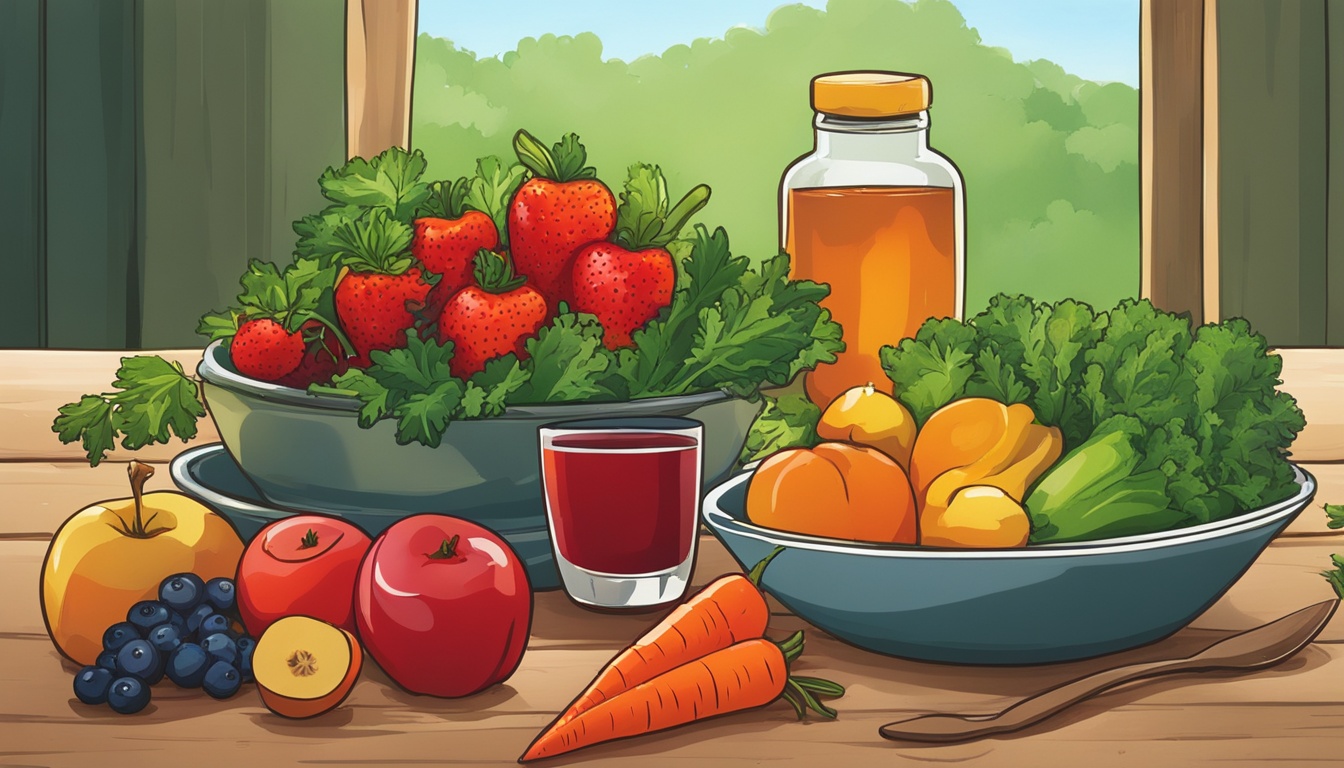Constipation makes your stomach feel bad. It can make you feel bloated. It can also make it hard to go to the bathroom. Luckily, there are many natural remedies for constipation.
These can help without using strong medicines. Let’s look at the top home remedies for constipation. We will talk about eating better, moving more, relaxing, and using natural laxatives. This way, you can feel better gently and naturally.
Do you sometimes feel constipated? Or does it happen a lot to you? Trying these how to relieve constipation methods can make going to the bathroom easier. It can also make your stomach feel better.
Learning about fiber-rich foods for constipation is a good start. Other natural ideas can also help you deal with constipation. By using these, you’re taking steps to get better.
What Is Constipation?
Constipation is when you have trouble with your stomach that affects many people worldwide. It means you don’t go to the bathroom often, or when you do, it’s hard and dry. Learning about what makes constipation happen and what it feels like can help in making it better.
Symptoms and Causes of Constipation
Getting constipated shows up as:
- Having a hard time when you go to the bathroom.
- Your poop being hard, in little pieces, or dried out.
- Feeling like you didn’t finish going to the bathroom.
- Having a sore belly or feeling swollen.
Many things can cause constipation. They include not eating enough fiber, not drinking enough water, not moving around a lot, or feeling stressed. Changes in your daily life, some medicines, or health issues can also be reasons. When you can’t get better and it lasts a long time, that’s called chronic constipation.
Constipation comes in different kinds, like feeling stopped up because your body isn’t working right. This is usually what people mean when they talk about constipation. But sometimes, it can also be because of other problems like irritable bowel syndrome (IBS) or if you’re pregnant. Knowing what’s causing you to be constipated helps to fix it right.
It’s important to know the signs of constipation and what might be causing it. This way, you can do things to help your stomach work better and feel well.
Exercise for Relieving Constipation
Adding exercise into your day helps you beat constipation. When you move around, your gut muscles wake up. This makes having regular poops easier. A review from 2019 says even a fast walk can make you go more often.
For constipation help, pick from different exercises like walking, running, or swimming. Yoga is also great. It all gets your gut moving right.
Here are the best exercises to fight constipation:
- Yoga poses like wind-relieving pose and twists can move your belly and make you poop easier.
- Doing exercises for your pelvic floor can make pushing out poop simpler.
- The 4-7-8 breathing trick can help your gut work better and keep you calm.
Always talk to your doctor first, especially if you’re not well. They can tell you what’s safe. More exercise each day can help you poop regularly and feel better.
Relaxation and Proper Posture
Relaxing and sitting right can help a lot with constipation. Stress can stop you from going to the bathroom. So, by making yourself calm and using the right toilet position, bowel trouble can get better.
Best Positions to Ease Bowel Movements
Raising your knees higher than your hips is great for bowels. Put a little step under your feet on the toilet. This makes your body in a better shape to poop.
Also, try leaning forward with your arms on your legs. Take deep breaths to feel calm. This can make using the bathroom much easier.
- Raise your knees above your hips using a footstool or step
- Lean forward and rest your forearms on your thighs
- Take deep, slow breaths to help relax your muscles
These tips can help with constipation and make your bowel movements better. Keeping a peaceful mind during this time is key for your stomach’s happiness.
Prunes: A Natural Laxative Fruit
Having trouble with going to the bathroom? Try prunes. They’re like a natural helper for constipation. This fruit is known for its fiber content. Fiber moves food through your body. Prunes also have something called sorbitol. This helps soften your poop by pulling water into your gut.
Studies show prunes are great for preventing and treating constipation. They work better than some medicines. That’s because prunes have a lot of power as a natural laxative.
It’s best to eat about six prunes a day if you’re an adult. If you drink prune juice, 4 to 8 ounces in the morning can help a lot. For babies, try 2 to 4 ounces of prune juice and change the amount if needed.
If you’re always constipated or have other tummy troubles, talk to a doctor. Prunes are good for most people. But, they might not be the best for everyone, especially if you have health problems.

Prunes do more than help with constipation. They keep you full, help control your weight, and lower diabetes risk. Eating prunes regularly is good for your belly’s health.
Senna: A Powerful Herbal Laxative
Feeling blocked up sometimes? Senna might be just what you need. It’s a strong natural laxative used for many years. It comes from a plant and works by helping the body pass stool easier.
You can get senna in different ways, like liquid, tablets, or tea. For many, senna tea is great because it’s easy to use. Just make sure to use it correctly and you’ll find help with constipation.
Safety and Side Effects of Senna
Senna is a natural way to fight constipation, but you have to be careful. Too much for too long can make your body depend on it. This could cause problems with how your digestion works.
- Abdominal cramps or discomfort
- Diarrhea
- Electrolyte imbalances
- Discoloration of urine or stool
Using senna the right way is very important. Don’t use it more than a week or two without talking to a doctor. It may not be okay if you’re taking other medicines or if you have certain health issues.
Remember, senna is strong, but it can be safe if you’re careful. If you’re really blocked up, see a doctor first. With their help, senna can offer a safe way out from digestive problems sometimes.
Kiwifruit: A Fiber-Rich Remedy
Do you sometimes have a hard time going to the bathroom? Eating kiwifruit might really help. Kiwis have a lot of fiber. Fiber is good for making you go regularly. A small study from 2019 even said kiwifruit can help your tummy work better. But we need more studies to be sure about this.
Kiwis are not just good for you, they taste great too. They help people who have problems with their stomachs like irritable bowel syndrome. The fiber in kiwis makes your poop bigger, so it’s easier to go. And the special things in kiwis also help your body break down food.
In one study, 45% of people who ate kiwis every day felt better after four weeks. They felt as good as people who ate prunes or psyllium, but without as many bad effects like feeling bloated. Only a small number of kiwi eaters felt bloated, much less than those who ate prunes or psyllium.
Most people who tried kiwifruit were happy about it. They liked it more than people who tried prunes or psyllium. And almost nobody who tried kiwis didn’t like it at all.
If you have a hard time going to the bathroom, eating more kiwi might help. Its fiber-rich and laxative benefits are good signs. It could be a great natural remedy.

Coffee: A Stimulant for Your Bowels
Feeling backed up? A cup of coffee could be your solution. It’s known to ease the troubles of slow digestion. Studies show coffee’s compounds get things moving in your gut, helping with constipation.
Though we’re not exactly sure how it works, caffeine and other elements in coffee can wake up your colon. For many, starting the day with a cup of coffee means finding relief from constipation’s discomfort.
Yet, coffee’s impact on constipation varies widely from person to person. While some get a boost from it, others see no change or it makes things worse. The golden rule is to listen to your body and adjust your coffee intake based on how you feel.
Want to try coffee for constipation? Begin with a little and see how it suits you. Even when you drink it might make a difference. Some people swear by it in the morning or after eating for smoother movements.
But remember, relying solely on coffee isn’t a great idea for the long run. If constipation is a constant problem, seeing a doctor is wise. They can help identify the root cause and suggest a more solid plan of action.
Flaxseed: Mucilage Fiber for Constipation
Dealing with constipation? Try adding flaxseed to your meals for a natural fix. Flaxseed has a lot of fiber, like mucilage fiber. This type of fiber turns into a gel when mixed with water. It can make your stool softer, working like a natural laxative.
Studies back up flaxseed as a way to help with constipation. In one, people with type 2 diabetes and constipation used flaxseed for 12 weeks. It really helped reduce how bad their constipation was.
How to Incorporate Flaxseed into Your Diet
To make flaxseed work best for constipation, start slow and drink plenty of water. Here’s how to add it to what you eat:
- Begin with just 1-2 tablespoons of whole or ground flaxseed daily. Slowly add more over time.
- Put flaxseed in foods you like, such as yogurt, oatmeal, smoothies, or baked goods.
- Flaxseed oil works too and gives you mucilage fiber benefits.
- Water helps the fiber from flaxseed do its job. Make sure to drink enough each day.
Flaxseed is okay on a low FODMAP diet. It’s good for people trying to avoid tummy troubles.
Using flaxseed in your meals can help you go more easily. It’s good for your gut because of its fiber. Just start with a little and see how your body reacts. Then, you can figure out the best amount for you.
Staying Hydrated: The Importance of Water
Drinking water is key for keeping our bodies working well. It helps with bowel movements and fighting constipation. The CDC tells us we should drink at least 64 ounces of fluids a day. Doing this and eating foods high in water content can solve constipation.
The body is mostly made up of water, about 60%. Not drinking enough means we lose water. This leads to problems like tiredness, headaches, and gut issues. Not having enough to drink hurts our thinking as well.
Getting 8 glasses of water a day is good for you. It helps with regular bathroom trips and stops you from getting clogged up. Fruits and veggies are also great because they have lots of water. Keeping hydrated is very important for our health. It’s a simple but great way to prevent constipation.
Being well-hydrated is good for more than just staying regular. It means we’re less likely to get stones in our pee or kidneys. It helps with losing weight and feeling better when we’ve had too much to drink. Making sure we drink enough keeps our digestive system healthy and our poops normal.
Fiber-Rich Foods for Constipation Relief
Dealing with constipation? Adding more fiber-rich foods to your meals can really help. Fiber keeps your digestive system working well. It helps move food through your intestines by making the muscles push.
Women should aim for 25-30 grams of fiber each day, while men need about 30-38 grams. Eating foods high in fiber will make you more regular and reduce constipation.
Start by adding these high fiber foods for constipation:
- Fruits like prunes, kiwifruit, and berries
- Vegetables such as broccoli, leafy greens, and artichokes
- Whole grains like oats, quinoa, and whole-wheat bread
- Legumes, including beans, lentils, and split peas
- Nuts and seeds, such as almonds, chia seeds, and flaxseeds
Adding these fiber-rich foods to what you eat helps you stay regular. But, don’t forget to drink plenty of water. This will help the fiber do its job.

Alongside more fiber, try prune juice, coffee, and herbs like senna. These can also ease constipation. Mix a fiber-filled diet with these other aids for better, lasting results.
Natural Remedies for Constipation
If you feel constipated, several natural ways might help you feel better. Alongside the natural laxatives we’ve mentioned, there are more options to explore. It’s good to talk to your doctor before trying new natural remedies. They can affect your medicines or have side effects.
Drinking herbal teas can make a big difference. Teas like peppermint, ginger, or chamomile can calm your stomach and help with bowel movements. Also, probiotics are small good germs that can help your stomach stay healthy. They are in foods like yogurt, kefir, or pickled veggies. You could also take a probiotics pill.
Some supplements may also ease constipation. For example, magnesium helps make stools softer by pulling in more water. Omega-3 helps with gut inflammation. Make sure to talk to your doctor first if you want to try these. That’s because they might not get along with your current medicines or cause side effects.
To find relief, try a mix of things. Changing your diet, moving more, and adding some herbal or supplement choices might help. Keep trying different things. With time, you should figure out what natural remedies are best for you.
Herbal Teas and Supplements
If you feel backed up, some herbal teas and supplements might help you out. Teas like senna, peppermint, and ginger can make things move better. They act gently to help you go to the bathroom.
There are also supplements that might make you feel better. Things like psyllium, methylcellulose, and magnesium can soften your stool. They do this by bringing extra water into your intestines.
Precautions with Herbal Remedies
But hold on a minute. Herbal teas and supplements are sometimes tricky. For example, too much senna or cascara sagrada might not be good for you. They could cause problems if not used the right way.
Always check with your doctor before you try new herbs or supplements. Especially if you’re already taking medicine. Your doctor knows best what will work well for you.

Eating right and exercising are key to keeping your gut healthy. Herbal teas and supplements can be good extra help. But they’re not the only answer. Keep up with a healthy diet and move around. Your tummy will thank you!
Remedies for Children and Pregnant Women
Both kids and pregnant women might deal with constipation a lot. It’s key to use the right and safe fixes for this. For kids, more fiber, staying wet, and a regular bathroom time can work. Moms-to-be can eat new foods, move more, and use okay stool softeners with a doctor’s ok.
Constipation Remedies for Kids
Handling constipation in kids might stress you out, but there are simple ways to make it better. Ask them to eat more fiber by adding fruits, veggies, and whole grains to their meals. Making sure they drink water all day is also a must. And try to get them on a toilet schedule every day where they try to go at the same times.
Constipation Relief for Pregnant Women
Becoming pregnant often means dealing with constipation, but some easy tips can help lessen the problem. Eating 25 to 30 grams of fiber every day is suggested. Moistening is vital, so drink eight 12-ounce glasses of water daily. Also, eating several small meals instead of three big ones can also aid in easing constipation.
Working out three times a week for 20 to 30 minutes might lessen constipation in pregnant ladies. A doctor might recommend a mild stool softener like Colace for a bit if needed, especially if you’re taking iron pills. However, using these too much could mess with your water levels and minerals, so it’s best to need them with a doctor’s advice.
Always talk to your doctor when it comes to constipation issues in children or during pregnancy. They’ll help you find safe and good ways to deal with it, just for your situation.
When to Seek Medical Attention
Some problems need a doctor’s help. If you’re constipated for more than a week, see your doctor. Also, if you have bad belly pain or see blood when you go, get medical advice. Losing a lot of weight quickly is another sign to talk to your doctor.
Bad or long-lasting constipation can lead to worse issues. These might include hemorrhoids or anal fissures. So, seeing a doctor early is smart. They can find out why you’re constipated and how to help.
Here are some big signs you need to see a doctor for constipation:
- Being constipated for over a week
- Having deep belly pain
- Blood in your stool
- Lost a lot of weight fast
- Hemorrhoids coming back a lot
- Anal fissures (tears around the anus)
- Fecal impaction (hard stool in the rectum)
If any of these show up, don’t wait to call your doctor. They might do some tests to check what’s going on. Tests could include blood checks or looking inside your bowels. This helps them make a plan to help you feel better.
Getting help for bad constipation early is key to staying healthy. The right care can put your bowel movements back in order. So, if you’re having a tough time, don’t hesitate to get help.

Lifestyle Changes for Long-Term Relief
To beat constipation for the long haul, you need to tweak your daily life. Simple changes can lead to regular digestion, naturally and for good.
Start by eating more foods packed with fiber. Adults should get 20-35 grams of fiber a day. Yet, many folks in the U.S. aren’t hitting that goal. Have high-fiber foods like dried figs, prunes, Asian pears, and raspberries with your meals and snacks.
Don’t forget to drink enough water. It makes your stool softer and helps keep your gut healthy.
- Do some exercise regularly. It can shake up your digestive system and steer clear of constipation, especially as you get older.
- Find a time after eating to visit the bathroom. This can train your body to go at regular times.
It’s vital to spot and tackle what’s causing your constipation. It could be stress or a break in your usual routine. Handle these issues to enjoy good, daily habits.
If you’re dealing with new or severe constipation, talk to a doctor if it lasts over 3 weeks. They can find the cause and map out a plan just for you.
Conclusion
There are many natural remedies for constipation. You can change what you eat and move more. Also, being calm helps, and you might try herbal things too. If you keep having trouble, see a doctor. They can find the best way to help you. By using natural ways, you can feel better and keep your stomach healthy.
It’s good to eat more food with fiber and drink lots of water. Exercise and staying relaxed are great too. Things like prunes, senna, and kiwifruit can help a lot. But, always try to figure out why you’re constipated. This will help you feel better for a long time.
So, try these ways to help your constipation. Talk to a doctor if you’re still worried or if it doesn’t get better. They will give you advice that’s just for you. You can beat constipation and have a stomach that feels good every day.
FAQ
What is constipation?
Constipation happens when it’s hard to poop. You might feel bloated and not go to the bathroom as usual. It’s when you poop less than three times a week.
What are the symptoms and causes of constipation?
Hard, dry stools are a sign of constipation. You might also feel like you can’t finish pooping. Not eating enough fiber or drinking water are common causes. So is not moving enough or feeling stressed.
How can exercise help relieve constipation?
Moving your body helps move stuff in your tummy, including poop. Walks or simple exercises can really make a difference. They keep your insides working well.
What are the best positions to ease bowel movements?
Sitting normally on the toilet isn’t the best way to poop. You can try sitting with your knees up. Leaning forward while breathing deeply helps too.
How can prunes help with constipation?
Prunes are like nature’s own poop helpers. They’re full of fiber and have something in them that makes water go to your tummy. This combo makes it easier to poop.
What are the benefits and safety considerations of senna?
Senna comes from a plant and can help you poop. But, using it too much can make your tummy lazy. So, it’s best to talk to a doctor before using it a lot.
How can kiwifruit help with constipation?
Eating kiwifruit can keep you from getting constipated. It’s full of fiber, which is great for your tummy. Some say it also helps your stomach work better.
How can coffee help with constipation?
Coffee can make you poop by waking up your tummy. It moves things along in there. This is thanks to the caffeine and other stuff in coffee.
How can flaxseed help with constipation?
Flaxseed has a special type of fiber that makes a goo when you add water. This goo helps make your poop softer. That makes it easier to go.
How much water should I drink to help with constipation?
It’s important to drink enough water every day. The CDC says 64 ounces is good. This, plus eating foods with water, can keep constipation away.
What are the best fiber-rich foods for constipation relief?
Foods like fruits, veggies, and whole grains are packed with fiber. Adding more of these to your meals helps your tummy stay on track. It’s natural and good for you.
What other natural remedies and precautions should I be aware of?
There are many ways to help with constipation, like teas, probiotics, or some minerals. But, always talk to a doctor first. They can make sure it’s safe for you.
How can constipation be addressed in children and pregnant women?
Kids need more fiber and water. Encouraging regular bathroom visits also helps. For expectant moms, eating right and moving more can work. Make sure to talk to a doctor about what’s safe for you.
When should I seek medical attention for constipation?
If you’re very blocked up for over a week or have serious pain, see a doctor. Blood in the poop or losing lots of weight is a big sign to get help.
How can I achieve long-term relief from constipation?
To keep constipation away, eat right, drink water, and move your body. Stick to a good bathroom schedule. Figuring out what causes your constipation helps to stop it from coming back.
















Leave a Comment